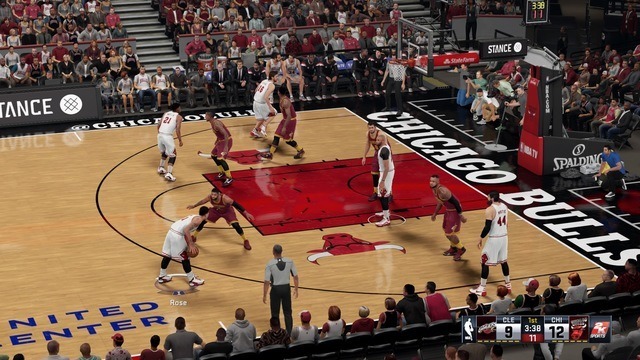Spike Lee’s marketed addition to NBA 2K16 is Livin’ da Dream, a narrative which drapes over the first season of My Player mode. It’s the conceptually interesting “game within a game,” which then succumbs to naivety and forcefulness.
Though Lee’s name is prominent, Livin’ da Dream carries but a pittance of his perceptual social consciousness. Lee has examined basketball’s power for the underprivileged in 1998’s He Got Game. Here in NBA 2K16, Lee appears overwhelmed by the chosen medium’s bevy of restrictions. Lee’s identifying work – typically commentary on current ethnic social roles – is swamped by thick exposition and scenes which appear disconnected from one another. Time constraints within yearly sports development appear to have left a multitude of key events dropped from this story.
What’s left references critical character moments without context, ideas without weight, and images that are invisible. Role playing as talented high school standout/NBA prospect Frequency Vibrations – or Freq (“Freak”) – Livin’ da Dream unfurls a personal life steeped with connections to a Harlem upbringing. Little of the circumstances are seen, rather spoken, leaving this visual media without visuals.
Metaphorically Speaking
Lee isn’t drawing on racial experience; he’s drawing atrocious, even spiteful racial bias…
What does appear is something inherently phony and dishonest, punctured by racial caricatures. The white team owner performs an embarrassing mimic of street culture as he discusses Bloomberg and stock markets – an inexcusably broadly drawn, oblivious 1% villain who demands Freq break from his projects-locked brotherhood with childhood friend Vic. Lee isn’t drawing on racial experience; he’s drawing atrocious, even spiteful racial bias based on America’s fair discontent with income inequality. Lee’s contrast of life in the projects to a multi-million dollar office space thus feels counterfeit.
Livin’ da Dream’s story leans on poverty while NBA 2K16’s overlapping exterior begs for microtransaction dollars to make Freq a better player.
The dichotomy is gross, more so than it has been in NBA 2K’s prior years. As Livin’ da Dream lambastes the narcissism abundant in wealth, it’s espousing financially beneficial features.
Money is literally making the player, contextual hypocrisy seeming too impossible to be real. Don’t pay, and Freq’s slow leveling makes him a role player. His numbers will sag below those of starting positions, even though dialog builds Freq toward superstar status. At six points a game, Freq earns a high dollar shoe deal. It’s hardly sensible context.
The idea within is novel. Kevin Harlan and the commentating crew handle some background exposition during played games – a sports movie cliché, which here integrates gameplay. How often they pinpoint and focus on Freq is odd. Still, this is better execution than characters spilling personal family history to one another, the perpetual method of choice in non-interactive segments.
Forward Thinking
If sports simulations are in dire need of a feature refresh, the potential in a single player story can be a solution. Mimicking or besting the predictable power of sports cinema available in Hoosiers, Miracle, or Rudy would be sublime. Bravery in using sports as a life metaphor properly – Remember the Titans – would lend the genre credence outside of the closed sim community.
Livin’ da Dream is not it, yet attempting this form of narrative as opposed to hokey “life sims” may have merit long term.
NBA 2K captures moments of sports unpredictability as well as Sony’s MLB: The Show.
Certainly, NBA 2K16 has blossomed into an interactive basketball dreamscape whose feature set is so wide, little else is left to discover. Presentation work is best-in-genre. Better physics in 2015 expand on-the-ball movement potential. Attention to minutiae is marvelous. NBA 2K captures moments of sports unpredictability as well as Sony’s MLB: The Show. Awkward fist bumps at the free throw line, crowds waving distracting face cut-outs, wild loose-ball plays, individual player motions; NBA 2K16 misses little. The two duel for “best of” monikers as EA’s NHL begins to creep into their ranks.
Then NBA 2K’s infuriating, turbulent server status act as a reminder of how everything is imperfect, made worse when Livin’ da Dream can be rendered unplayable when servers fall off.
It’s a cyclical fault 2K has never addressed while building on their feature-stuffed core. Now there’s a story which can sometimes be played based on the whims of technology. Worse, the fix is a matter of cutting loose the microtransaction Virtual Currency. NBA 2K is persistent about saving digital dollars server side. It’s absurd, and it shows an ironic feebleness to Spike Lee’s allegory. Money always wins.









Published: Oct 5, 2015 07:21 am